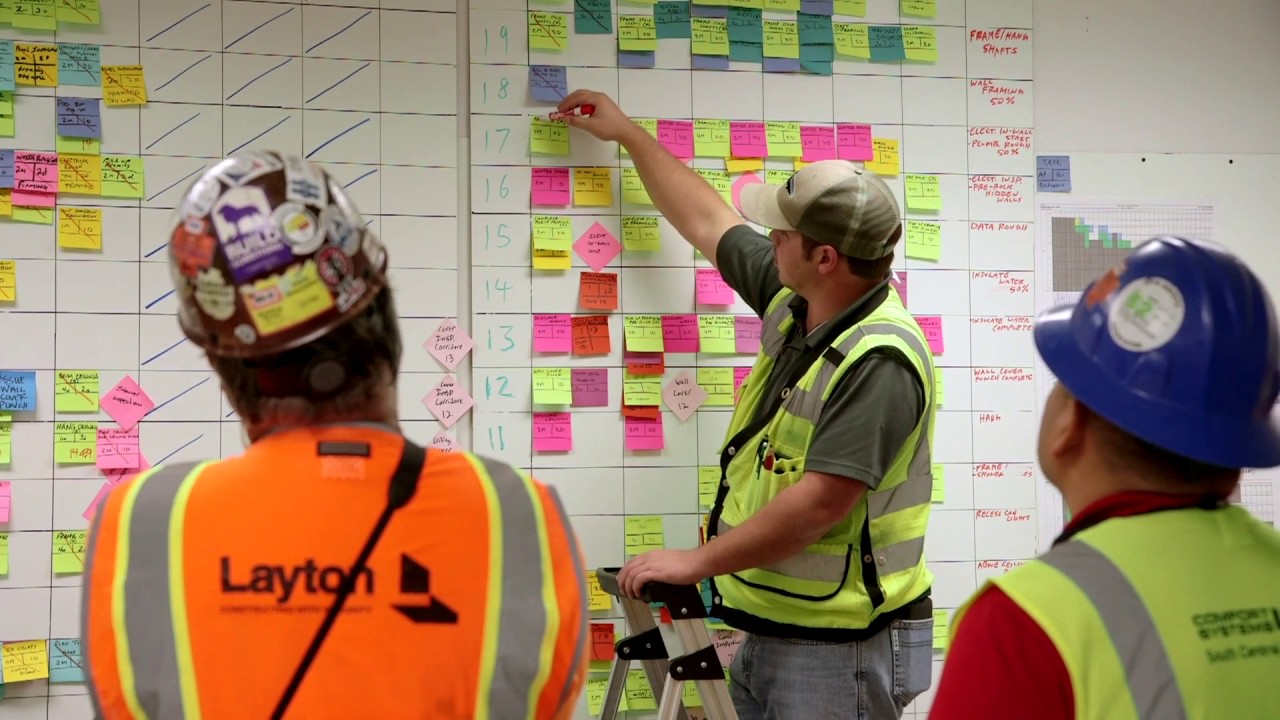Home>diy>Building & Construction>What Does A Construction Engineer Do?


Building & Construction
What Does A Construction Engineer Do?
Modified: January 24, 2024
Discover the role of a construction engineer in the building construction industry. Gain insights into their responsibilities, expertise, and contributions to successful projects.
(Many of the links in this article redirect to a specific reviewed product. Your purchase of these products through affiliate links helps to generate commission for Storables.com, at no extra cost. Learn more)
Introduction
Welcome to the world of construction engineering! If you’ve ever marveled at a towering skyscraper, a structurally sound bridge, or a beautifully crafted building, you have witnessed the work of a construction engineer. These professionals play a crucial role in ensuring the successful completion of construction projects, overseeing every stage from design to execution.
In simple terms, construction engineers are the masterminds behind turning architectural designs into concrete realities. They possess the knowledge, skills, and expertise to create safe, functional, and aesthetically pleasing structures that withstand the test of time.
In this article, we will explore the exciting field of construction engineering, shedding light on the responsibilities, skills, education, work environment, salary, and job outlook. Whether you’re considering a career in this field or simply eager to learn more, join us as we dive into the fascinating world of construction engineering.
Key Takeaways:
- Construction engineers are the masterminds behind turning architectural designs into concrete realities, overseeing project planning, construction management, quality control, cost estimation, and problem-solving to ensure successful project completion.
- A career in construction engineering offers promising salary potential and steady job prospects, with a focus on infrastructure development, sustainability, and advanced technologies. Construction engineers play a vital role in shaping the built environment and contributing to society’s infrastructure needs.
Responsibilities of a Construction Engineer
A construction engineer’s role encompasses a wide range of responsibilities, requiring a strong sense of technical expertise, problem-solving abilities, and effective communication skills. Let’s take a closer look at some of the key responsibilities that construction engineers undertake:
- Project Planning and Design: Construction engineers are involved in the initial planning and design phase of a project. They collaborate with architects, contractors, and other professionals to ensure that the design meets the client’s requirements and adheres to safety codes and regulations. They evaluate the feasibility of the project, considering factors such as budget, materials, and time constraints.
- Construction Management: Once the project is approved, construction engineers supervise the entire construction process. They manage construction crews, oversee the implementation of plans, and ensure that the project stays on schedule and within budget. They also coordinate with subcontractors, submit progress reports, and address any issues or changes that arise during construction.
- Quality Control and Safety: Construction engineers are responsible for ensuring that all construction activities meet the highest quality standards. They conduct regular inspections, perform tests on materials, and monitor the work of subcontractors to verify compliance with safety regulations. They are vigilant in identifying and resolving any potential hazards or risks to prevent accidents and ensure the safety of workers and the public.
- Cost Estimation and Budgeting: A crucial aspect of a construction engineer’s role is to provide accurate cost estimations for the project. They evaluate the costs of labor, materials, equipment, and other expenses to develop a comprehensive budget. They also monitor expenses throughout the construction process and make adjustments as needed to stay within the allocated budget.
- Problem Solving and Troubleshooting: Construction projects often encounter unexpected challenges or complications. Construction engineers are skilled problem solvers, utilizing their technical knowledge and experience to identify solutions. Whether it’s resolving design conflicts, adapting to unforeseen site conditions, or mitigating construction delays, they play a critical role in finding innovative solutions and maintaining project continuity.
These are just a few examples of the many responsibilities that construction engineers handle. Their role requires a diverse skill set, as they must stay up-to-date with the latest construction techniques, materials, and technologies in order to deliver successful projects.
Skills and Qualifications
Construction engineering is a demanding profession that requires a combination of technical prowess, problem-solving abilities, and effective communication skills. Here are some of the key skills and qualifications necessary to thrive in this field:
- Technical Expertise: Construction engineers must have a strong foundation in engineering principles and possess a deep understanding of construction processes, materials, and techniques. They should be proficient in using construction software and tools to carry out design tasks and analyze data.
- Project Management: Effective project management is crucial in construction engineering. Construction engineers need to be skilled in planning, organizing, and coordinating resources to ensure projects are completed on time, within budget, and to the client’s satisfaction. They should possess strong leadership skills to manage teams and address any issues that may arise during construction.
- Problem-Solving Abilities: The ability to identify and solve complex problems is essential for a construction engineer. They encounter various challenges throughout a project’s lifecycle, such as design conflicts, material shortages, or unforeseen site conditions. Construction engineers should be adept at analyzing situations, evaluating alternatives, and implementing effective solutions.
- Communication Skills: Construction engineers interact with clients, architects, contractors, and workers on a regular basis. Clear and effective communication is key to ensuring everyone is on the same page. Construction engineers must be able to convey technical information in a concise and understandable manner, both verbally and in written form.
- Attention to Detail: Every aspect of a construction project requires meticulous attention to detail. From reviewing architectural plans to conducting quality inspections, construction engineers need to spot even the smallest errors or discrepancies. Attention to detail is critical to ensure the safety, functionality, and quality of the completed structure.
- Analytical Thinking: Construction engineers must possess strong analytical skills to evaluate data, assess risks, and make informed decisions. They need to interpret complex engineering calculations, analyze project specifications, and anticipate potential issues to develop effective strategies.
In terms of qualifications, most construction engineering positions require a bachelor’s degree in civil engineering or a related field. Some professionals may pursue further education or certifications to specialize in areas such as structural engineering, geotechnical engineering, or construction management. It is also essential to stay updated with advancements in construction technology and industry standards through continued learning and professional development.
By combining the right skills and qualifications, construction engineers can excel in their careers and contribute to the successful completion of construction projects.
Education and Training
To pursue a career in construction engineering, a solid educational foundation is essential. Here is an overview of the typical education and training required in this field:
Bachelor’s Degree: The first step towards becoming a construction engineer is obtaining a bachelor’s degree in civil engineering or a related field. This four-year program provides students with a comprehensive understanding of engineering principles, construction techniques, and design fundamentals. Coursework typically covers subjects such as structural analysis, construction materials, project management, and engineering mathematics.
Master’s Degree (Optional): While not always necessary, obtaining a master’s degree in construction engineering, civil engineering, or a related specialization can provide a competitive edge in the job market. A master’s degree allows individuals to deepen their knowledge and expertise in a specific area, such as environmental sustainability, structural analysis, or construction management.
Internships and Co-op Programs: Many universities offer internships or cooperative education (co-op) programs, providing students with practical, hands-on experience. These opportunities allow aspiring construction engineers to apply their knowledge in real-world settings and gain valuable insights into the construction industry. Internships and co-op programs also provide opportunities to network with professionals and potentially secure employment after graduation.
Licensing: In order to practice as a professional engineer, construction engineers must obtain a license. The specific licensing requirements vary by jurisdiction, but generally involve completing a bachelor’s degree from an accredited engineering program, obtaining a certain amount of work experience, and passing a licensing exam. Some states may also require additional exams or assessments to demonstrate competency in specific engineering disciplines.
Continuing Education: Construction engineering is a field that continually evolves with advancements in technology, regulations, and best practices. As a result, ongoing professional development is crucial to stay current and enhance career prospects. Construction engineers can attend seminars, workshops, and conferences, or pursue additional certifications to expand their knowledge and skills in specialized areas such as construction management, sustainable design, or building information modeling (BIM).
It is worth noting that practical experience is highly valued in the construction engineering field. Many employers prefer candidates with previous experience in the construction industry, whether through internships, co-op programs, or entry-level positions. Graduates can gain valuable hands-on experience by working on construction sites, assisting engineers in design firms, or participating in construction projects as part of a team.
Overall, a combination of a solid educational background, practical experience, and a commitment to lifelong learning and professional development can pave the way for a successful career in construction engineering.
A construction engineer oversees the planning, design, and construction of projects. They ensure safety, quality, and adherence to regulations. Good communication and problem-solving skills are essential in this role.
Work Environment
Construction engineers work in a dynamic and ever-changing environment, navigating between job sites, offices, and client meetings. Here are some key aspects of the work environment for construction engineers:
Job Sites: Construction engineers spend a significant amount of time on job sites, overseeing the construction process, coordinating with contractors and workers, and ensuring that the project is progressing according to the plan. This may involve working outdoors, in various weather conditions, and sometimes in hazardous environments. Construction engineers must adhere to strict safety protocols, including wearing personal protective equipment (PPE) and staying vigilant for potential hazards.
Office Work: Construction engineers also spend time in the office, performing tasks such as project planning, design review, cost estimation, and report writing. They utilize specialized software and tools to create designs, analyze data, and develop project schedules. Time in the office allows construction engineers to collaborate with architects, clients, and other team members, ensuring that the project meets the desired objectives and specifications.
Travel: Depending on the nature and location of the project, construction engineers may have to travel frequently to various job sites. This could involve local or international travel, sometimes for extended durations. Travel allows construction engineers to conduct site inspections, monitor construction progress, and address any issues that may arise during the project.
Collaborative Work: Construction engineering involves working closely with a range of professionals, including architects, surveyors, contractors, subcontractors, and government officials. Effective communication and collaboration are essential to ensure that everyone is on the same page and that the project is executed smoothly. Construction engineers must possess excellent interpersonal skills to build strong working relationships with team members and stakeholders.
Deadlines and Pressure: Construction projects often operate under tight deadlines and budget constraints. Construction engineers must be able to work well under pressure, managing multiple tasks and responsibilities simultaneously. They need to make critical decisions and solve problems efficiently to keep the project on track and meet the client’s expectations.
Professional Development: Construction engineering is a field that requires continuous learning and professional development. Construction engineers need to stay updated with the latest industry trends, technological advancements, and regulatory changes. This may involve attending professional workshops, seminars, and conferences, as well as pursuing additional certifications to enhance their skills and knowledge.
Overall, the work environment for construction engineers is a blend of active and dynamic job sites coupled with office-based tasks. It requires a balance of technical expertise, communication skills, and adaptability to thrive in this challenging and rewarding profession.
Read more: What Do Lead Construction Engineers Do
Salary and Job Outlook
Construction engineering offers promising career prospects, both in terms of salary potential and job opportunities. Let’s explore the average salary range and the job outlook for construction engineers:
Salary: The salary of a construction engineer can vary depending on factors such as experience, education, location, and the size and complexity of the projects they work on. According to the U.S. Bureau of Labor Statistics, the median annual wage for civil engineers, which includes construction engineers, was $87,060 in May 2020. However, those with extensive experience and advanced qualifications may earn significantly higher salaries, reaching six figures.
Job Outlook: The job outlook for construction engineers is positive, with a projected growth rate of 2% from 2019 to 2029, according to the U.S. Bureau of Labor Statistics. This rate is slower than the average for all occupations but still indicates steady job opportunities in the field. Construction engineers will be needed to oversee the repair, maintenance, and upgrading of infrastructure, as well as to ensure compliance with changing regulations and sustainability practices.
With the increasing emphasis on sustainable construction, green building practices, and infrastructure development, there will be a demand for construction engineers who possess expertise in these areas. Those with specialized knowledge in building information modeling (BIM) and other advanced technologies will also have an advantage in the job market.
The job outlook may vary by location and the specific sectors within the construction industry. Metropolitan areas with significant construction projects, such as major cities or regions undergoing urbanization, may offer more job opportunities for construction engineers.
Furthermore, as the construction industry continues to evolve, construction engineers who possess strong skills in project management, budgeting, and risk assessment will be in high demand. The ability to adapt to new construction methods, technologies, and sustainability practices will also enhance job prospects in this field.
Overall, construction engineering presents an exciting career path with competitive salary potential and steady job prospects. It offers the opportunity to make a lasting impact on the world by contributing to infrastructure development and creating structures that benefit society.
Conclusion
Construction engineering is a challenging and rewarding profession that plays a vital role in shaping the built environment. Construction engineers are the architects of modern infrastructure, ensuring that buildings, bridges, and other structures are safe, functional, and visually appealing.
In this article, we have explored the responsibilities, skills, education, work environment, salary, and job outlook for construction engineers. We have seen that construction engineers are involved in every stage of a project, from planning and design to construction management and quality control. Their technical expertise, problem-solving abilities, and effective communication skills are essential to successfully completing construction projects.
Education and training are crucial aspects of becoming a construction engineer. Most professionals in this field hold a bachelor’s degree in civil engineering or a related field, and some may pursue advanced degrees or specialized certifications to enhance their knowledge and skills. Practical experience through internships or cooperative education programs is highly valuable in gaining hands-on experience.
The work environment for construction engineers is dynamic, with a mix of time spent on job sites and in the office. They collaborate with a variety of professionals, travel to different locations, and must handle deadlines and pressure to deliver successful projects. Continuing education and professional development are essential to stay updated with industry advancements and maintain competitiveness in the field.
Construction engineering offers a promising salary potential and job outlook. Job opportunities are expected to grow steadily, with a focus on infrastructure development, sustainability, and advanced technologies. Construction engineers who possess specialized skills and knowledge in these areas will have a competitive advantage in the job market.
In conclusion, construction engineering is a fulfilling career that combines technical expertise, creativity, and problem-solving to create structures that shape our communities. With its blend of challenges and opportunities, construction engineering offers a pathway to a rewarding and impactful profession.
Frequently Asked Questions about What Does A Construction Engineer Do?
Was this page helpful?
At Storables.com, we guarantee accurate and reliable information. Our content, validated by Expert Board Contributors, is crafted following stringent Editorial Policies. We're committed to providing you with well-researched, expert-backed insights for all your informational needs.















0 thoughts on “What Does A Construction Engineer Do?”